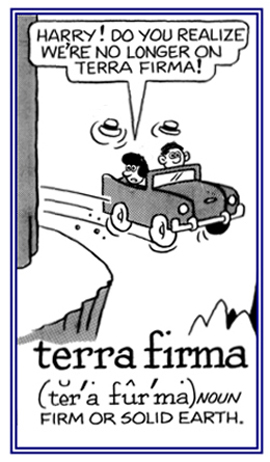terr-, terra-, -ter
(Latin: earth, dry land, land)
This unit presents many words that are used in references having to do with earth and land; that is, the loose, fragmented material that composes part of the surface of this planet that we live on.
Don't confuse this element with other words that are spelled in a similar way; such as, terrify, terrible.
2. Ceramic wares made of this material: The terra cottas were made of porous clay and fired or baked at a low temperature.
2. Etymology: from Modern Latin terra firma, "firm land"; from Latin terra "earth, land" + firma, "strong, steadfast".

Go to this Word A Day Revisited Index
so you can see more of Mickey Bach's cartoons.
2. A new or unexplored field of knowledge: The expression terra incognita is often used in referring to matters about which one is uninformed, e.g. "I don't think I can do this because it is terra incognita to me."
2. A row of houses on a level above the general surface, or on the face of a rising ground: A terrace is a series of homes of uniform style on a site slightly, if at all, raised above the level of the roadway.
3. An open, often paved area adjacent to a house serving as an outdoor living space; a patio: The couple enjoyed their evening meal outside on the terrace next to the roses.
4. A flat, narrow stretch of ground, often having a steep slope facing a river, lake, or sea: Mary and her friends walked along the seaside terrace enjoying the warm breezes.
5. Ety,mology: about 1515, "gallery, portico, balcony", later "flat, raised place for walking" (1575), from Modern French terrace.
Originating from Old French terrasse "platform (built on or supported by a mound of earth)", from Vulgar Latin terracea, feminine of terraceus "earthen, earthy".
Originating from Latin terra "earth, land". As a natural formation in geology, traced back to 1674.
2. The act or process of creating a terrace or terraces: The crew from the construction company started their terracing early in the morning.
The strange organisms were terraforming the environment of their celestial planet in order to make it capable of supporting earth-life forms.
The organisms wanted to terraform its surface and atmosphere so that life as it exists on Earth would be feasible.
2. Used very broadly as a synonym for "planetary engineering" in general: Since space exploration is in its infancy, a good deal of terraforming remains very speculative and serves to stimulate the imaginations of science-fiction writers.
2. Etymology: from Latin terranum, terrenum, "land, ground"; from terrenus, "of earth, earthly"; from terra, "earth, land"; literally, "dry land" (as opposed to the "sea"); from Greek teresesthai, "to become dry" or "to be dry"; Latin torrere "to dry up, to parch".


